Cultural Management Essay: Perspectives on Korean Project Leadership
VerifiedAdded on 2020/02/18
|5
|1011
|48
Essay
AI Summary
This essay delves into the complexities of cultural management within the context of a Korean SI project, analyzing the leadership styles of co-managers Ellen and Jack. It examines their perspectives on competence, drawing on Hofstede's Cultural Model to understand the impact of Korean cultural dimensions such as power distance, individualism, masculinity, uncertainty avoidance, and long-term orientation. The essay further explores their client approaches through the application of Kluckhohn and Stodtbeck’s values orientation theory. It highlights how Ellen, despite facing challenges from a dominant Korean consultant, successfully navigated the cultural landscape. The essay concludes by providing insightful perspectives on competence and approaches adopted by Ellen and Jack in leading the Korean project.
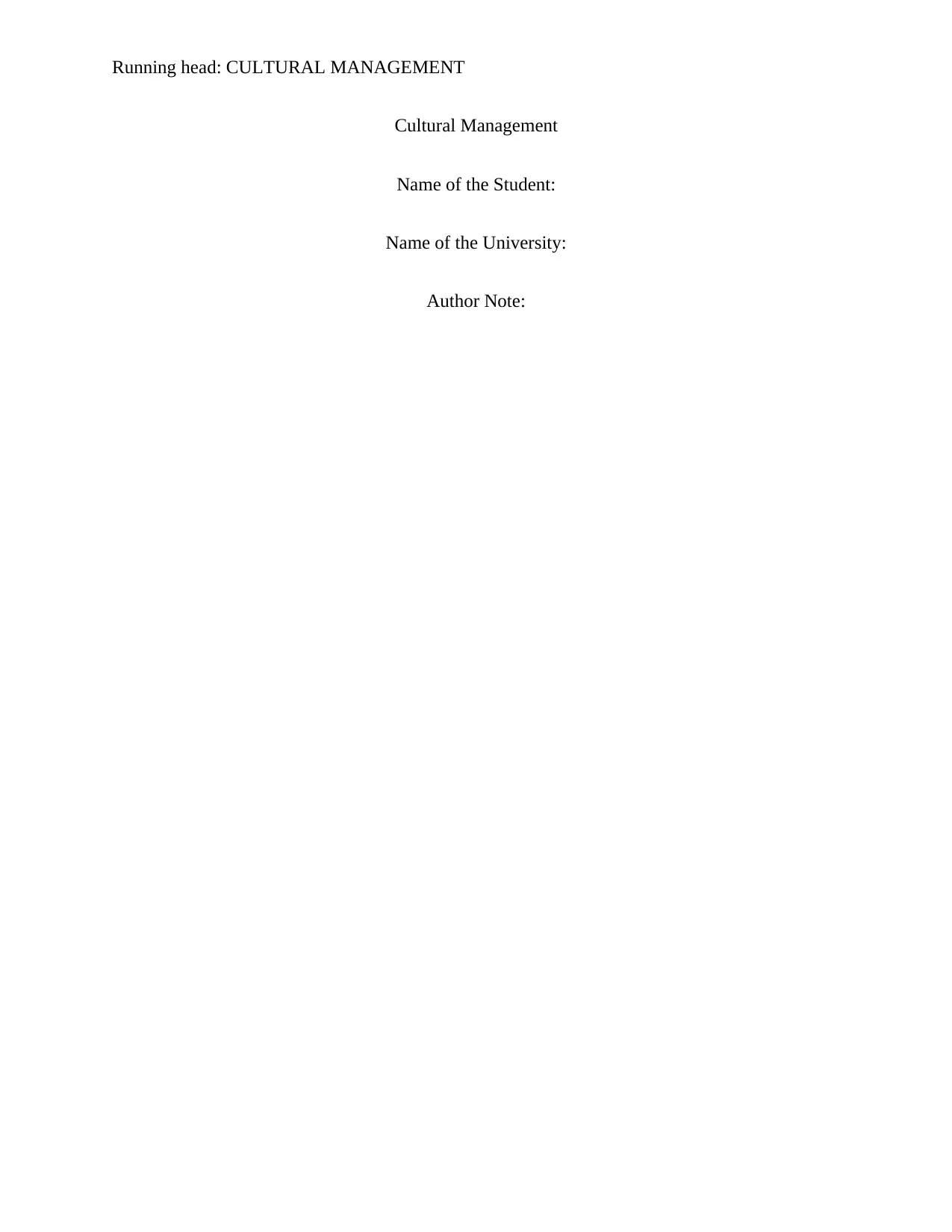
Running head: CULTURAL MANAGEMENT
Cultural Management
Name of the Student:
Name of the University:
Author Note:
Cultural Management
Name of the Student:
Name of the University:
Author Note:
Paraphrase This Document
Need a fresh take? Get an instant paraphrase of this document with our AI Paraphraser
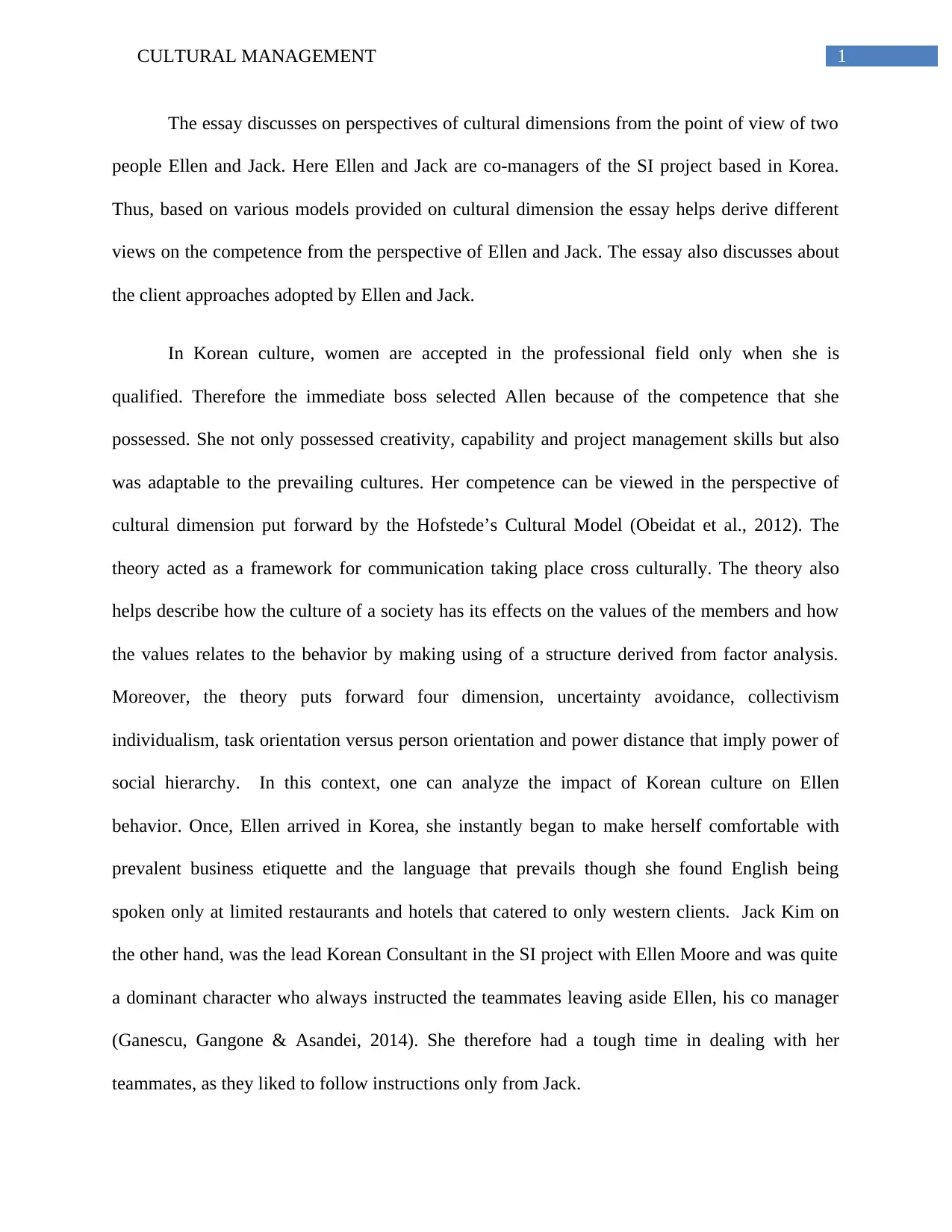
1CULTURAL MANAGEMENT
The essay discusses on perspectives of cultural dimensions from the point of view of two
people Ellen and Jack. Here Ellen and Jack are co-managers of the SI project based in Korea.
Thus, based on various models provided on cultural dimension the essay helps derive different
views on the competence from the perspective of Ellen and Jack. The essay also discusses about
the client approaches adopted by Ellen and Jack.
In Korean culture, women are accepted in the professional field only when she is
qualified. Therefore the immediate boss selected Allen because of the competence that she
possessed. She not only possessed creativity, capability and project management skills but also
was adaptable to the prevailing cultures. Her competence can be viewed in the perspective of
cultural dimension put forward by the Hofstede’s Cultural Model (Obeidat et al., 2012). The
theory acted as a framework for communication taking place cross culturally. The theory also
helps describe how the culture of a society has its effects on the values of the members and how
the values relates to the behavior by making using of a structure derived from factor analysis.
Moreover, the theory puts forward four dimension, uncertainty avoidance, collectivism
individualism, task orientation versus person orientation and power distance that imply power of
social hierarchy. In this context, one can analyze the impact of Korean culture on Ellen
behavior. Once, Ellen arrived in Korea, she instantly began to make herself comfortable with
prevalent business etiquette and the language that prevails though she found English being
spoken only at limited restaurants and hotels that catered to only western clients. Jack Kim on
the other hand, was the lead Korean Consultant in the SI project with Ellen Moore and was quite
a dominant character who always instructed the teammates leaving aside Ellen, his co manager
(Ganescu, Gangone & Asandei, 2014). She therefore had a tough time in dealing with her
teammates, as they liked to follow instructions only from Jack.
The essay discusses on perspectives of cultural dimensions from the point of view of two
people Ellen and Jack. Here Ellen and Jack are co-managers of the SI project based in Korea.
Thus, based on various models provided on cultural dimension the essay helps derive different
views on the competence from the perspective of Ellen and Jack. The essay also discusses about
the client approaches adopted by Ellen and Jack.
In Korean culture, women are accepted in the professional field only when she is
qualified. Therefore the immediate boss selected Allen because of the competence that she
possessed. She not only possessed creativity, capability and project management skills but also
was adaptable to the prevailing cultures. Her competence can be viewed in the perspective of
cultural dimension put forward by the Hofstede’s Cultural Model (Obeidat et al., 2012). The
theory acted as a framework for communication taking place cross culturally. The theory also
helps describe how the culture of a society has its effects on the values of the members and how
the values relates to the behavior by making using of a structure derived from factor analysis.
Moreover, the theory puts forward four dimension, uncertainty avoidance, collectivism
individualism, task orientation versus person orientation and power distance that imply power of
social hierarchy. In this context, one can analyze the impact of Korean culture on Ellen
behavior. Once, Ellen arrived in Korea, she instantly began to make herself comfortable with
prevalent business etiquette and the language that prevails though she found English being
spoken only at limited restaurants and hotels that catered to only western clients. Jack Kim on
the other hand, was the lead Korean Consultant in the SI project with Ellen Moore and was quite
a dominant character who always instructed the teammates leaving aside Ellen, his co manager
(Ganescu, Gangone & Asandei, 2014). She therefore had a tough time in dealing with her
teammates, as they liked to follow instructions only from Jack.
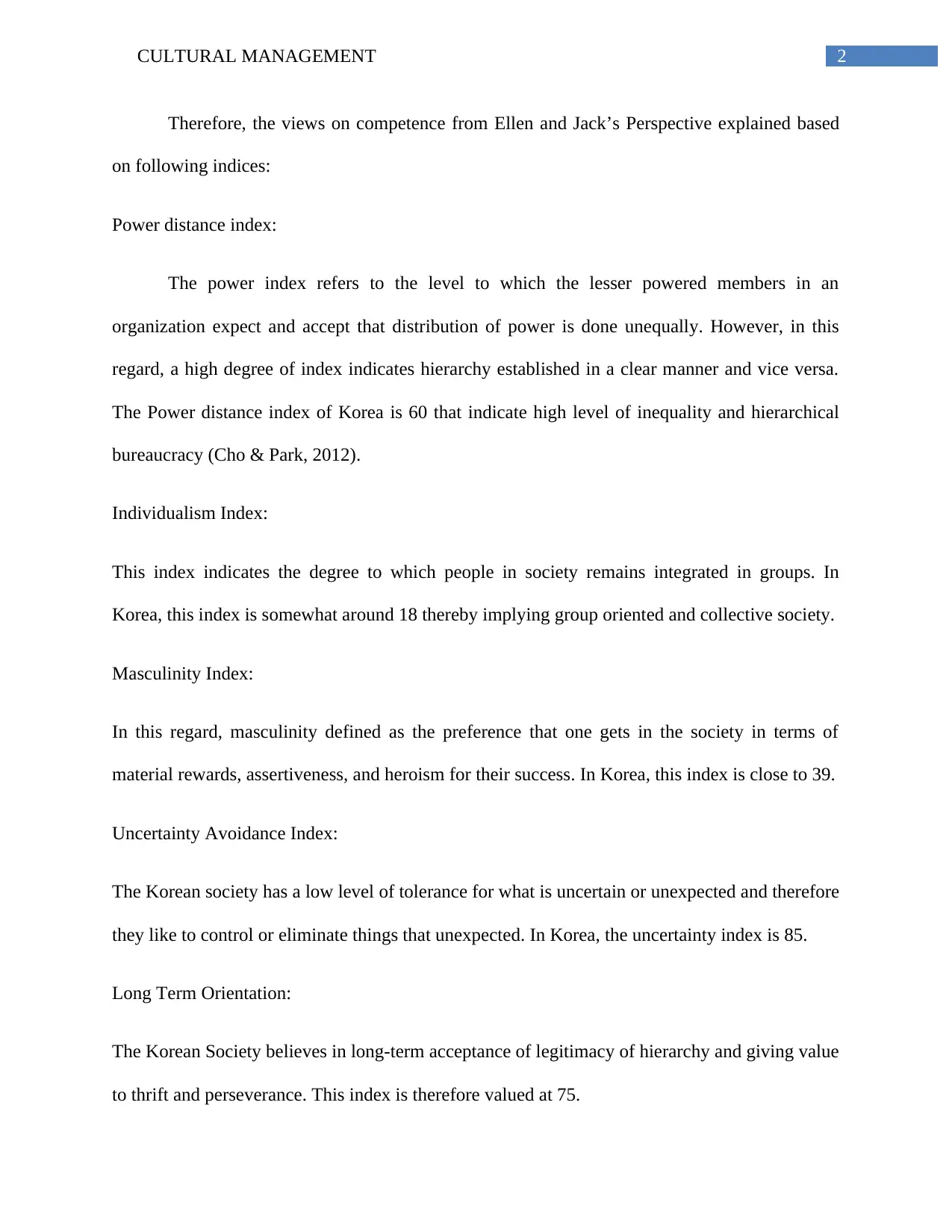
2CULTURAL MANAGEMENT
Therefore, the views on competence from Ellen and Jack’s Perspective explained based
on following indices:
Power distance index:
The power index refers to the level to which the lesser powered members in an
organization expect and accept that distribution of power is done unequally. However, in this
regard, a high degree of index indicates hierarchy established in a clear manner and vice versa.
The Power distance index of Korea is 60 that indicate high level of inequality and hierarchical
bureaucracy (Cho & Park, 2012).
Individualism Index:
This index indicates the degree to which people in society remains integrated in groups. In
Korea, this index is somewhat around 18 thereby implying group oriented and collective society.
Masculinity Index:
In this regard, masculinity defined as the preference that one gets in the society in terms of
material rewards, assertiveness, and heroism for their success. In Korea, this index is close to 39.
Uncertainty Avoidance Index:
The Korean society has a low level of tolerance for what is uncertain or unexpected and therefore
they like to control or eliminate things that unexpected. In Korea, the uncertainty index is 85.
Long Term Orientation:
The Korean Society believes in long-term acceptance of legitimacy of hierarchy and giving value
to thrift and perseverance. This index is therefore valued at 75.
Therefore, the views on competence from Ellen and Jack’s Perspective explained based
on following indices:
Power distance index:
The power index refers to the level to which the lesser powered members in an
organization expect and accept that distribution of power is done unequally. However, in this
regard, a high degree of index indicates hierarchy established in a clear manner and vice versa.
The Power distance index of Korea is 60 that indicate high level of inequality and hierarchical
bureaucracy (Cho & Park, 2012).
Individualism Index:
This index indicates the degree to which people in society remains integrated in groups. In
Korea, this index is somewhat around 18 thereby implying group oriented and collective society.
Masculinity Index:
In this regard, masculinity defined as the preference that one gets in the society in terms of
material rewards, assertiveness, and heroism for their success. In Korea, this index is close to 39.
Uncertainty Avoidance Index:
The Korean society has a low level of tolerance for what is uncertain or unexpected and therefore
they like to control or eliminate things that unexpected. In Korea, the uncertainty index is 85.
Long Term Orientation:
The Korean Society believes in long-term acceptance of legitimacy of hierarchy and giving value
to thrift and perseverance. This index is therefore valued at 75.
⊘ This is a preview!⊘
Do you want full access?
Subscribe today to unlock all pages.

Trusted by 1+ million students worldwide
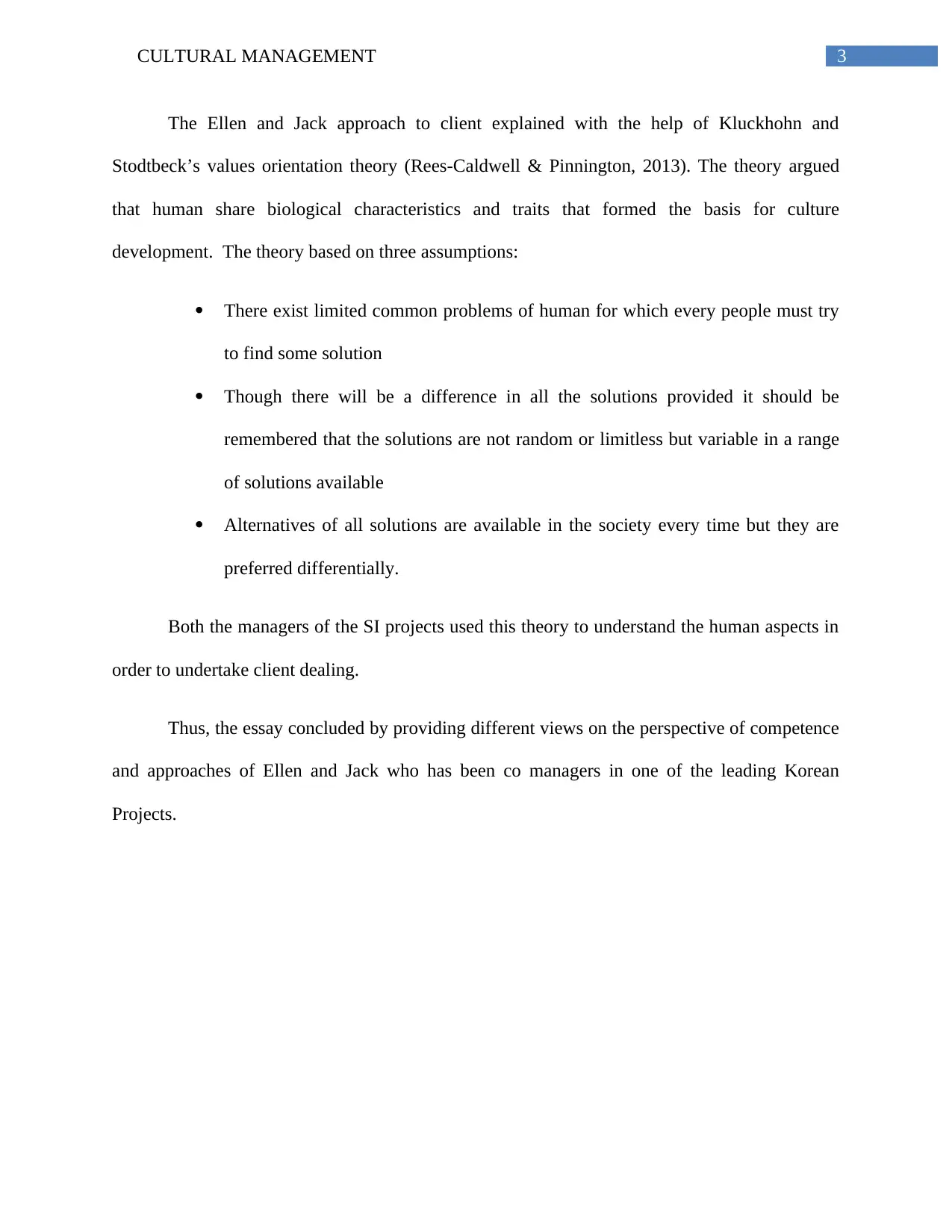
3CULTURAL MANAGEMENT
The Ellen and Jack approach to client explained with the help of Kluckhohn and
Stodtbeck’s values orientation theory (Rees-Caldwell & Pinnington, 2013). The theory argued
that human share biological characteristics and traits that formed the basis for culture
development. The theory based on three assumptions:
There exist limited common problems of human for which every people must try
to find some solution
Though there will be a difference in all the solutions provided it should be
remembered that the solutions are not random or limitless but variable in a range
of solutions available
Alternatives of all solutions are available in the society every time but they are
preferred differentially.
Both the managers of the SI projects used this theory to understand the human aspects in
order to undertake client dealing.
Thus, the essay concluded by providing different views on the perspective of competence
and approaches of Ellen and Jack who has been co managers in one of the leading Korean
Projects.
The Ellen and Jack approach to client explained with the help of Kluckhohn and
Stodtbeck’s values orientation theory (Rees-Caldwell & Pinnington, 2013). The theory argued
that human share biological characteristics and traits that formed the basis for culture
development. The theory based on three assumptions:
There exist limited common problems of human for which every people must try
to find some solution
Though there will be a difference in all the solutions provided it should be
remembered that the solutions are not random or limitless but variable in a range
of solutions available
Alternatives of all solutions are available in the society every time but they are
preferred differentially.
Both the managers of the SI projects used this theory to understand the human aspects in
order to undertake client dealing.
Thus, the essay concluded by providing different views on the perspective of competence
and approaches of Ellen and Jack who has been co managers in one of the leading Korean
Projects.
Paraphrase This Document
Need a fresh take? Get an instant paraphrase of this document with our AI Paraphraser
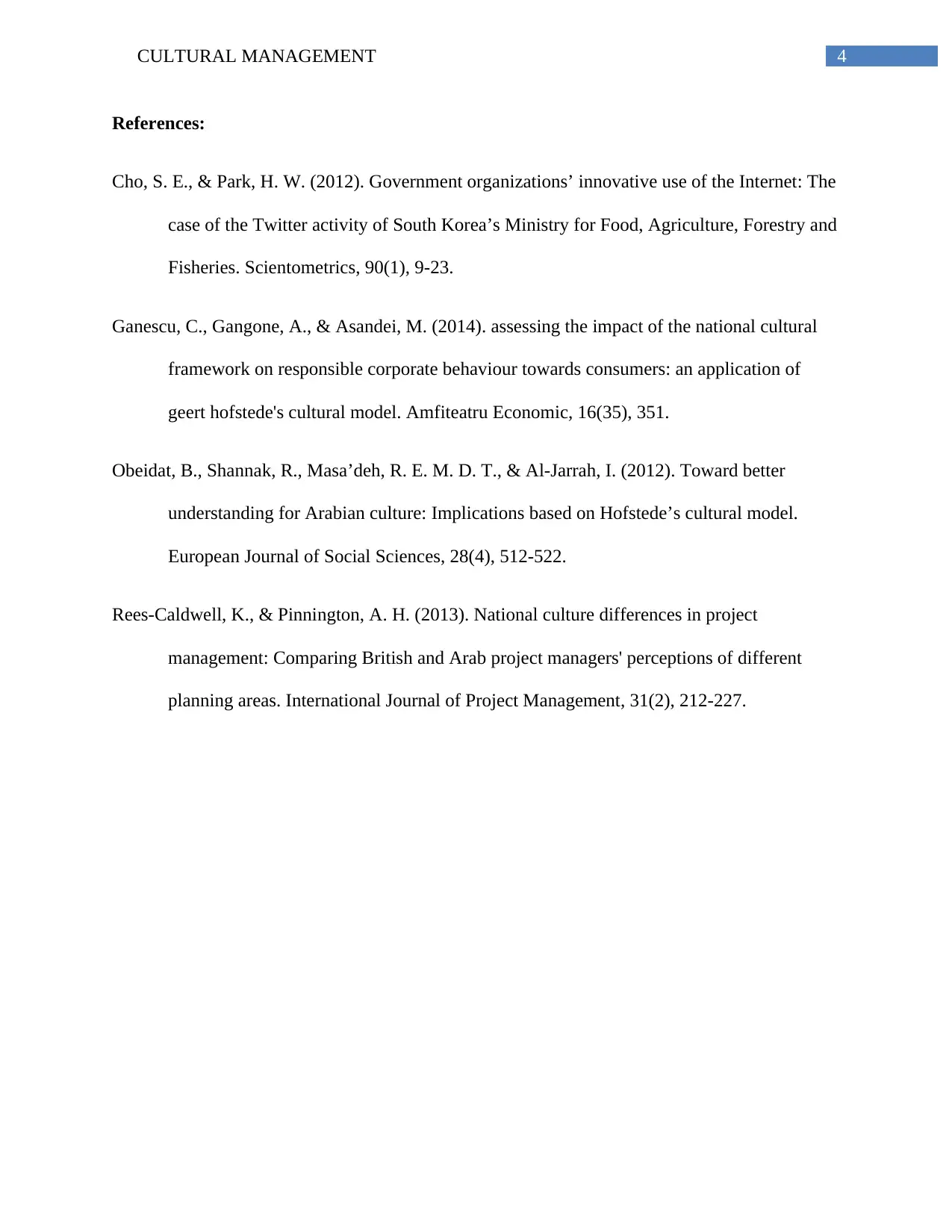
4CULTURAL MANAGEMENT
References:
Cho, S. E., & Park, H. W. (2012). Government organizations’ innovative use of the Internet: The
case of the Twitter activity of South Korea’s Ministry for Food, Agriculture, Forestry and
Fisheries. Scientometrics, 90(1), 9-23.
Ganescu, C., Gangone, A., & Asandei, M. (2014). assessing the impact of the national cultural
framework on responsible corporate behaviour towards consumers: an application of
geert hofstede's cultural model. Amfiteatru Economic, 16(35), 351.
Obeidat, B., Shannak, R., Masa’deh, R. E. M. D. T., & Al-Jarrah, I. (2012). Toward better
understanding for Arabian culture: Implications based on Hofstede’s cultural model.
European Journal of Social Sciences, 28(4), 512-522.
Rees-Caldwell, K., & Pinnington, A. H. (2013). National culture differences in project
management: Comparing British and Arab project managers' perceptions of different
planning areas. International Journal of Project Management, 31(2), 212-227.
References:
Cho, S. E., & Park, H. W. (2012). Government organizations’ innovative use of the Internet: The
case of the Twitter activity of South Korea’s Ministry for Food, Agriculture, Forestry and
Fisheries. Scientometrics, 90(1), 9-23.
Ganescu, C., Gangone, A., & Asandei, M. (2014). assessing the impact of the national cultural
framework on responsible corporate behaviour towards consumers: an application of
geert hofstede's cultural model. Amfiteatru Economic, 16(35), 351.
Obeidat, B., Shannak, R., Masa’deh, R. E. M. D. T., & Al-Jarrah, I. (2012). Toward better
understanding for Arabian culture: Implications based on Hofstede’s cultural model.
European Journal of Social Sciences, 28(4), 512-522.
Rees-Caldwell, K., & Pinnington, A. H. (2013). National culture differences in project
management: Comparing British and Arab project managers' perceptions of different
planning areas. International Journal of Project Management, 31(2), 212-227.
1 out of 5
Related Documents
Your All-in-One AI-Powered Toolkit for Academic Success.
+13062052269
info@desklib.com
Available 24*7 on WhatsApp / Email
![[object Object]](/_next/static/media/star-bottom.7253800d.svg)
Unlock your academic potential
Copyright © 2020–2026 A2Z Services. All Rights Reserved. Developed and managed by ZUCOL.




